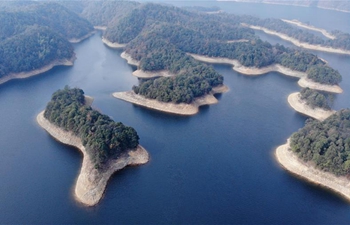ANKARA, Dec. 6 (Xinhua) -- The maritime boundaries deal sealed between Turkey and the internationally recognized government in Libya has angered regional neighbors, inflaming tensions in eastern Mediterranean over energy resources.
The agreement, inked in Istanbul on Nov. 27 to delimit and especially extend maritime zones for Turkish energy explorations, is an attempt to block further Greek and Cypriot energy drilling activities in the Mediterranean, a move hailed as a "historic step" by the Turkish press and experts.
However, it has received condemnation from Greece and its Cypriot ally, which would likely add to a long list of tensions between Ankara and its NATO allies as the bloc celebrates its 70th anniversary.
The controversial issue has been brought to the attention of NATO nations' leaders during a summit on Wednesday in London, according to sources.
The area spanning from southwest Turkey to northeast Libya cuts across a zone currently claimed by Greece and Cyprus, where plans for a future gas pipeline are in the works to link European markets to eastern Mediterranean gas fields.
The deal follows the imposition of European Union (EU) economic sanctions against Ankara a month ago to punish it for drilling near the coast of Cyprus.
"This agreement with Libya is seen as a game changer by Turkish authorities. It is considered to be a historic one," Turkish political commentator Serkan Demirtas told Xinhua.
"Experts believe that it will increase Turkey's continental shelf in eastern Mediterranean by up to 30 percent" and aims to kill Greece and regional partners ambitions to isolate Turkey, he said.
Greece and Turkey have long claimed rights to the oil and gas reserves off the island of Cyprus. In recent months, the tensions escalated with Turkish drilling operations protected by navy ships which led to accusations from Cyprus and EU sanctions.
Turkey is not a signatory to the 1982 United Nations convention regulating maritime boundaries and does not recognize the Republic of Cyprus and its agreements for an exclusive economic zone that were reached with Egypt, Lebanon and Israel.
Turkey says it is operating in the waters on its own continental shelf, or areas where the self-declared "Turkish Republic of Northern Cyprus has rights." Ankara also insists that "the agreement with Libya is in accordance with international law."
Metin Gurcan, a Turkish expert on security affairs, hailed the Turkish-Libyan deal as "an important, timely and comprehensive move" that will have a direct impact on the current geostrategic posture in eastern Mediterranean region.
He indicated that this Turkish diplomatic attack in the Mediterranean should be further strengthened by forming new partnerships in the region in order to break Ankara's "isolation" over this delicate issue which some observers fear that has the potential of triggering an armed conflict.
Turkey and Greece are allies in NATO but have long been at loggerheads over Cyprus which has been ethnically split between Greek and Turkish Cypriots since 1974.
The Republic of Cyprus in the south of the island is a member of the EU, while the Turkish part in the north is only recognized by Turkey.
Several peacemaking efforts have failed over the years and the discovery of offshore resources off Cyprus in the last decade has made things even more complicated.
Earlier this year, in response to the Republic of Cyprus' drilling activities in partnership with the U.S. and Italian consortiums, Turkey sent its own ships guarded by gunboats. And a drilling has recently been launched by Ankara, despite international warnings.
On Saturday, Turkish President Recep Tayyip Erdogan rebuffed foreign criticism, insisting that his country will not pull out its drilling vessels and will further implement the deal with Libya to extend Turkey's maritime border in the Mediterranean.
Cem Gurdeniz, a retired Turkish admiral, said that for the moment a Turkish compromise with main contender Greece is unlikely, but on the other hand, reaching deals with Egypt and even Syria could be expected in the future.
"Turkey's agreements with Libya is a real game changer and is expected to enhance a new and important process" in eastern Mediterranean, Gurdeniz wrote in a column in the Aydinlik daily.

















